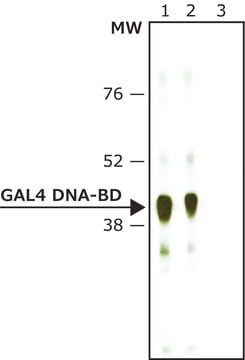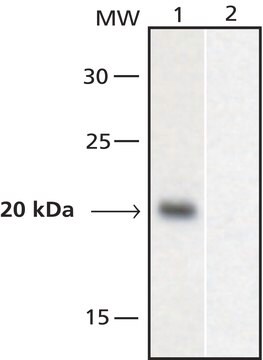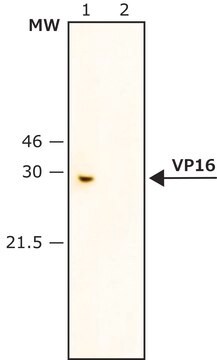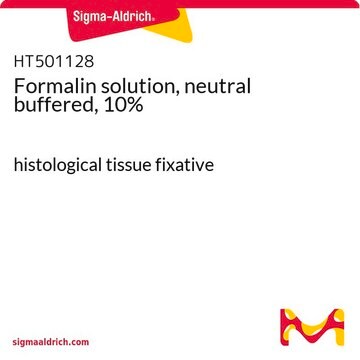ABE476
Anti-GAL4 Antibody (activation domain)
from rabbit, purified by affinity chromatography
Synonyme(s) :
Regulatory protein GAL4
About This Item
Produits recommandés
Source biologique
rabbit
Niveau de qualité
Forme d'anticorps
affinity isolated antibody
Type de produit anticorps
primary antibodies
Clone
polyclonal
Produit purifié par
affinity chromatography
Espèces réactives
yeast
Technique(s)
western blot: suitable
Numéro d'accès NCBI
Numéro d'accès UniProt
Conditions d'expédition
wet ice
Modification post-traductionnelle de la cible
unmodified
Informations sur le gène
Saccharomyces cerevisiae ... Gal4(855828)
Description générale
Spécificité
Immunogène
Application
Epigenetics & Nuclear Function
Cell Cycle, DNA Replication & Repair
Qualité
Western Blot Analysis: A 1:160,000 dilution of this antibody detected Gal4 in 5 mg of Gal4 positive (+ recombinant Gal4) yeast cell lysate. This antibody also detected small mounts of endogenous Gal4 in Gal4 negative (- recombinant Gal4) yeast cell lysate.
Description de la cible
Liaison
Forme physique
Stockage et stabilité
Remarque sur l'analyse
Gal4 positive and Gal4 negative yeast
Clause de non-responsabilité
Not finding the right product?
Try our Outil de sélection de produits.
Code de la classe de stockage
12 - Non Combustible Liquids
Classe de danger pour l'eau (WGK)
WGK 1
Point d'éclair (°F)
Not applicable
Point d'éclair (°C)
Not applicable
Certificats d'analyse (COA)
Recherchez un Certificats d'analyse (COA) en saisissant le numéro de lot du produit. Les numéros de lot figurent sur l'étiquette du produit après les mots "Lot" ou "Batch".
Déjà en possession de ce produit ?
Retrouvez la documentation relative aux produits que vous avez récemment achetés dans la Bibliothèque de documents.
Notre équipe de scientifiques dispose d'une expérience dans tous les secteurs de la recherche, notamment en sciences de la vie, science des matériaux, synthèse chimique, chromatographie, analyse et dans de nombreux autres domaines..
Contacter notre Service technique


![GAL4 [(1-147) + VP16 (411-490)] from Saccharomyces cerevisiae human herpesvirus 2 recombinant, expressed in E. coli, ≥80% (SDS-PAGE)](/deepweb/assets/sigmaaldrich/product/images/195/570/27f4c1ab-cab8-46e7-bd1a-04978b89bacc/640/27f4c1ab-cab8-46e7-bd1a-04978b89bacc.jpg)




